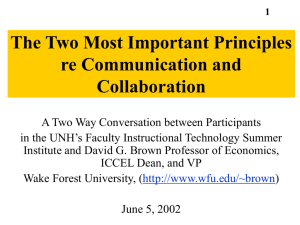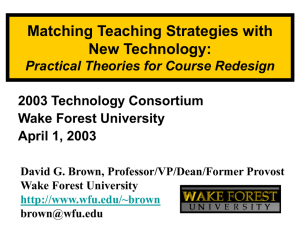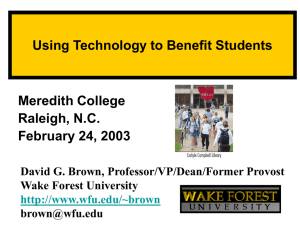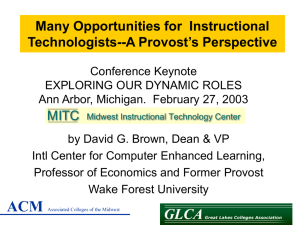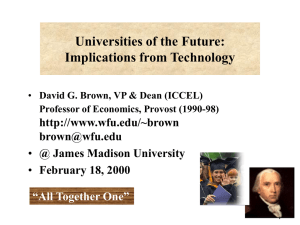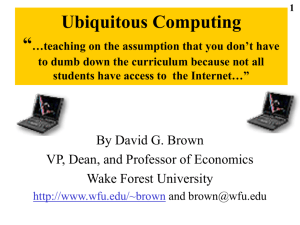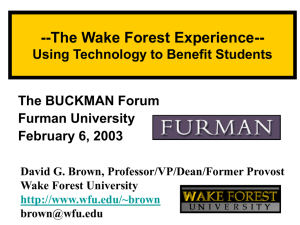Using Technology to Benefit Students
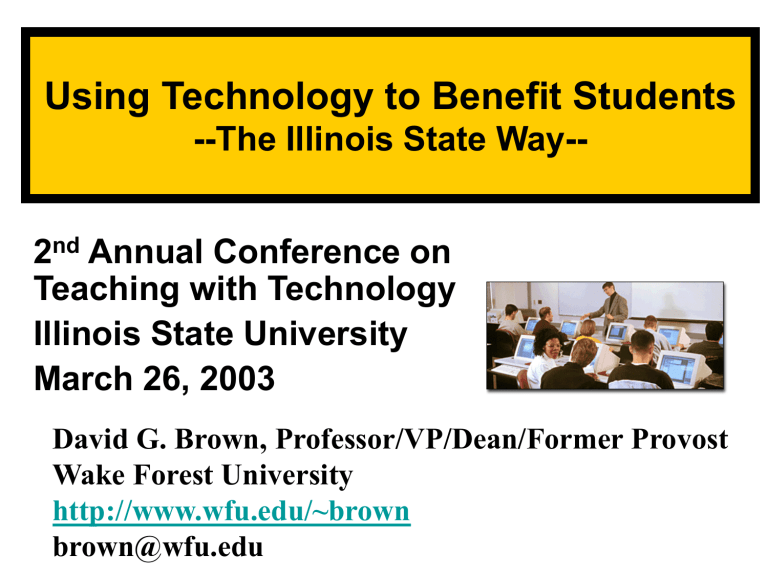
Using Technology to Benefit Students
--The Illinois State Way--
2 nd Annual Conference on
Teaching with Technology
Illinois State University
March 26, 2003
David G. Brown, Professor/VP/Dean/Former Provost
Wake Forest University http://www.wfu.edu/~brown brown@wfu.edu
Outline of Remarks
1.
Today’s passions re teaching and learning!
2.
What we’re doing at Wake Forest!
3. What about the future?
4. YOUR comments, reactions, questions
How has the computer changed teaching and learning?
1. It’s caused every teacher to rethink & redesign.
2. By increasing student options, it has increased competition and compelled universities to pay more attention to the quality of teaching
Our profession has been changed forever!
Reflections upon my
State Farm Fellowship Venture
Looking back, I believe that a lot of time and effort was wasted as a consequence of my
“not understanding what changes I was making and why I was making them.”
Cyndee Brown, March 26, 2003
…so many options…so little time
Reasons 150 Professors Added
Computer Enhancements
1. Communication-Interaction
2. Collaboration-Teams
3. Controversy-Debate
4. Customization-Diversity
5. Consultants-Adjuncts www.ankerpub.com/books/brown.html www.ablongman.com/professional/catalog/academic/product/1,4096,0205355803,00.html
A Ubiquitous Computing
Environment
…
all teaching proceeds on the assumption that all students and faculty have as much access to the Internet as they have to the library
The curriculum is not dumbed down!
Pop Quiz
Let’s have a show of hands!
Do you believe – at Illinois State Today – that it’s realistic to teach “ on the assumption that all students and faculty have as much access to the Internet as they have to the library”?
Examples from Illinois State
• Cyndee Brown
• Meredith Downes
• Jeff Courtright, Diane Clemens,
Paul Brauchle, Jodi Hallsten
• Will Reger, Alan Lessoff, Monica
Noraian, Silvana Siddalil
• Ryan Brown
• Ann Weber, Gary Weilbacher
FIRST YEAR SEMINAR
The Economists’ Way of Thinking
• To understand a liberal arts education as an opportunity to study with professors who think by their own set of concepts
• To learn how to apply economic concepts
• To learn how to work collaboratively
• To learn computer skills
• To improve writing and speaking
Students = 15
All Freshmen
Required Course
Brown’s First Year Seminar
• Before Class
– Students Find URLs &
Identify Criteria
– Interactive exercises
– Muddiest Point
– Lecture Notes
– E-mail dialogue
– Cybershows
• During Class
– One Minute Quiz
– Computer Tip Talk
– Class Polls
– Team Projects
• After Class
– Edit Drafts by Team
– Guest Editors
– Hyperlinks & Pictures
– Access Previous Papers
• Other
– Daily Announcements
– Team Web Page
– Personal Web Pages
– Exams include Computer
– Portfolio
– Materials Forever
ICCEL -- Wake Forest University, 2003
Consequences of the Ubiquitous
Assumption for Wake Forest
• +SAT Scores & Class Ranks Level
• +Retention & Grad Rates Up
• +Satisfaction & Learning Up
• +Faculty Recruitment Success Up http://www.wfu.edu/administration/ir/docs/ accmea.pdf
ICCEL -- Wake Forest University, 2003
Communication-Interaction
Computers Enhance
Teaching & Learning Via--
Presentations
Better--20%
More Opportunities to
Practice & Analyze--35%
More Access to Source
Materials via Internet--43%
More Communication with Faculty Colleagues, Classmates, and Between Faculty and Students--87%
ICCEL -Wake Forest University, 2003
Computers allow people----
• to belong to more communities
•
•
• to be more actively engaged in each community with more people over more miles
Florida State
FYS Reunion
Band Dinner
• for more months and years
• TO BE MORE COLLABORATIVE
ICCEL -- Wake Forest University, 2003
Impact of the Plan for the Class of 2000,
No. of Items with Significant Differences in
Wake Forest Student Responses,
CSEQ Questionnaire
2002 Survey versus 1998 Survey
Computer Usage………………..…2002 wins 6-2
Information Fluency………….…...2002 wins 5-1
Integration of Knowledge………..2002 wins 3-0
Specific Knowledge & Skills…….2002 wins 6-1
Interpersonal Communication…..2002 wins 8-0
CoCurricular Participation……...2002 wins 5-0
Source: Ross Griffith, Wake Forest Univ. Institutional Research Office.
http://www.wfu.edu/administration/ir/docs/CSEQComparison2002.pdf
Integration of Knowledge Items
• Worked on project where you had to integrate ideas
• Putting ideas together, seeing relationships
• Developed role play, case study, simulation for class
Black= 2002 significantly greater than 1998.
Italics Red= 1998 significantly greater than 2002
Specific Knowledge & Skills
• Acquired job-related knowledge/skills
• Seeing the importance of history
• Write clearly and effectively
• Developing own values & ethical standards
• Acquired specialization for further education
• Broadening acquaintance with & enjoyment of literature
• Memorized formulas, definitions, technical terms
Black= 2002 significantly greater than 1998.
Italics Red= 1998 significantly greater than 2002
Interpersonal Communication
• Met with faculty to discuss group activities
• Talked with instructor re info related to course
• Discussed project ideas with a faculty member
• Held conversation about the economy
• Conversation about international relations
• Conversation about current events in the news
• Conversation about the arts
• Presenting effectively when speaking with others
Black= 2002 significantly greater than 1998.
Italics Red= 1998 significantly greater than 2002
Impact of the Plan for the Class of 2000,
No. of Items with Significant Differences in
Wake Forest Student Responses,
CSEQ Questionnaire
2002 Survey versus 1998 Survey
Computer Usage………………..…2002 wins 6-2
Information Fluency………….…...2002 wins 5-1
Integration of Knowledge………..2002 wins 3-0
Specific Knowledge & Skills…….2002 wins 6-1
Interpersonal Communication…..2002 wins 8-0
CoCurricular Participation……...2002 wins 5-0
Source: Wake Forest University Institutional Research Office.
http://www.wfu.edu/administration/ir/docs/CSEQComparison2002.pdf
Research Results
• University of Central Florida---
Hybrid courses win! (the 80-20 rule)
• 18,844 students at 71 American Universities---
More “good practices” for wired students!
http://epaa.asu.edu/epaa/v9n49.html
• 150 professors at 50 Research Universities---
Interaction, Collaboration, Debate, Custom,
Adjuncts!
• Virginia Polytechnic University---
Calculus failure rate cut by 44%!
What about the future?
1. Early results from the research
2. The Highest Benefit/Cost Uses
3. Education Trends Extended
Low Hanging Fruit
[within the constraints of time & money]
1. URLs
2. Email
3. Course Management System
Better 85% Some Use Vs 5% Heavy Use
How is the computer changing teaching & learning
?
• Collaboration Magnified!
More exchange between professors and students.
• Learning Magnified!
More interactive teaming and collaborative assignments.
• Relevance Magnified!
More contact with off campus practitioners and constituencies.
• Community Magnified!
More active members of more co-curricular organizations .
The 21
st
Century Context
• Personal. Customized. Interactive.
• Gold Standard = Hybrid (80-20 & 20-80)
• On Line Only for New Buyers & Over-Served
• Student-Centered Curriculum
• “ Houses ” instead of Disciplines
• Loose-leaf Collections of Course
Components, instead of Textbooks
• Collaborative Teaching
• Teams of Professionals to Support Learning
• Engaged Learning
Comments and Questions
Let’s Talk!
Also, on your index card, please write to me your own observation about the future of teaching and learning.
Also, share a comment or question. Record your email address, if you’d like a response
.
David G. Brown
Wake Forest University
Winston-Salem, NC 27109,
336-758-4878 email: brown@wfu.edu
http//:www.wfu.edu/~brown fax: 336-758-5012
Wake Forest University, 2003
